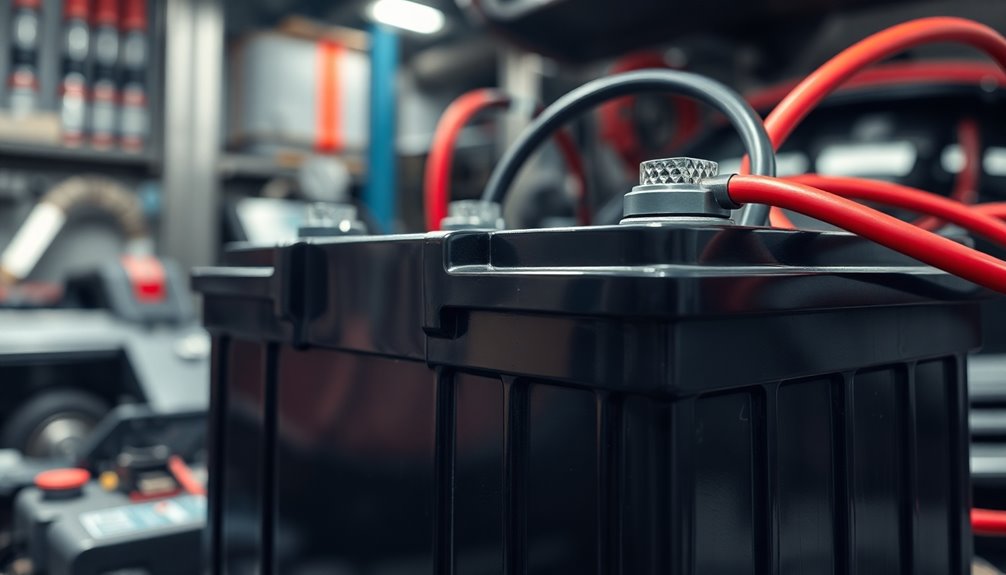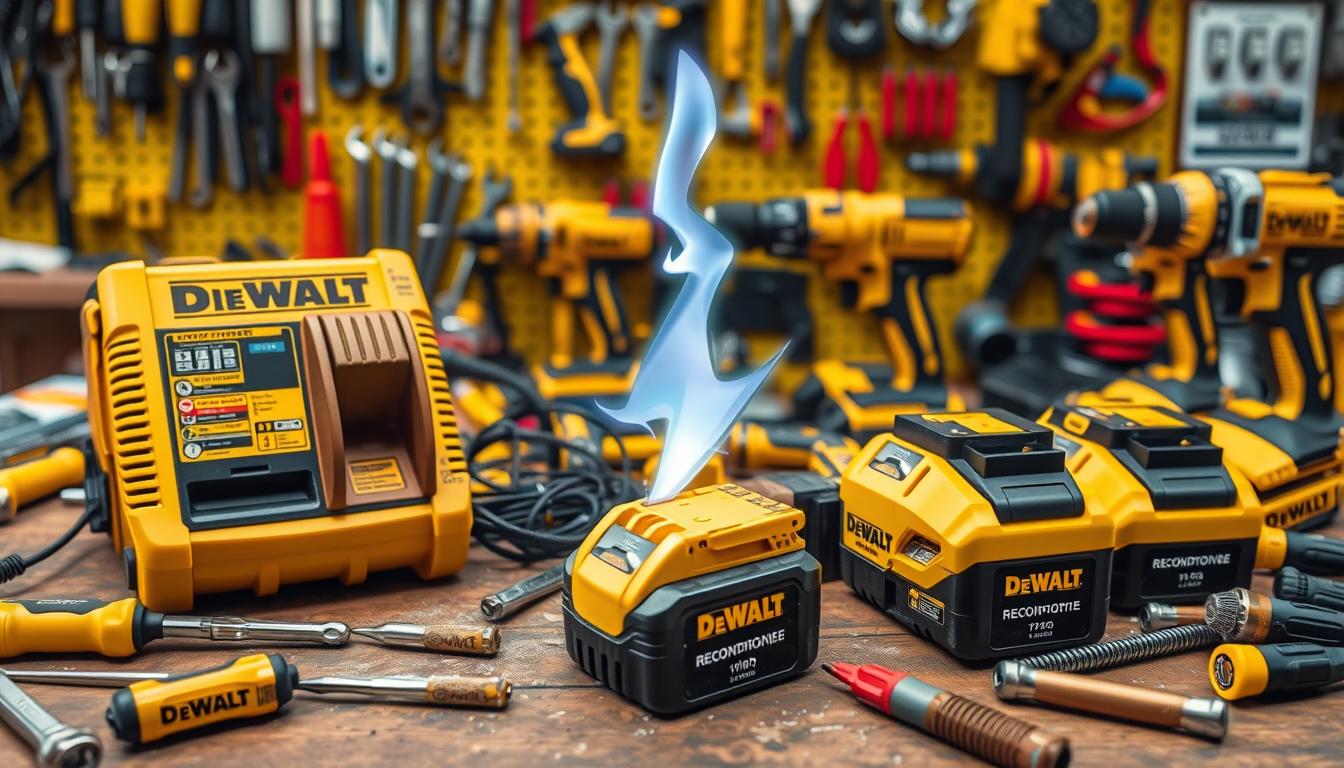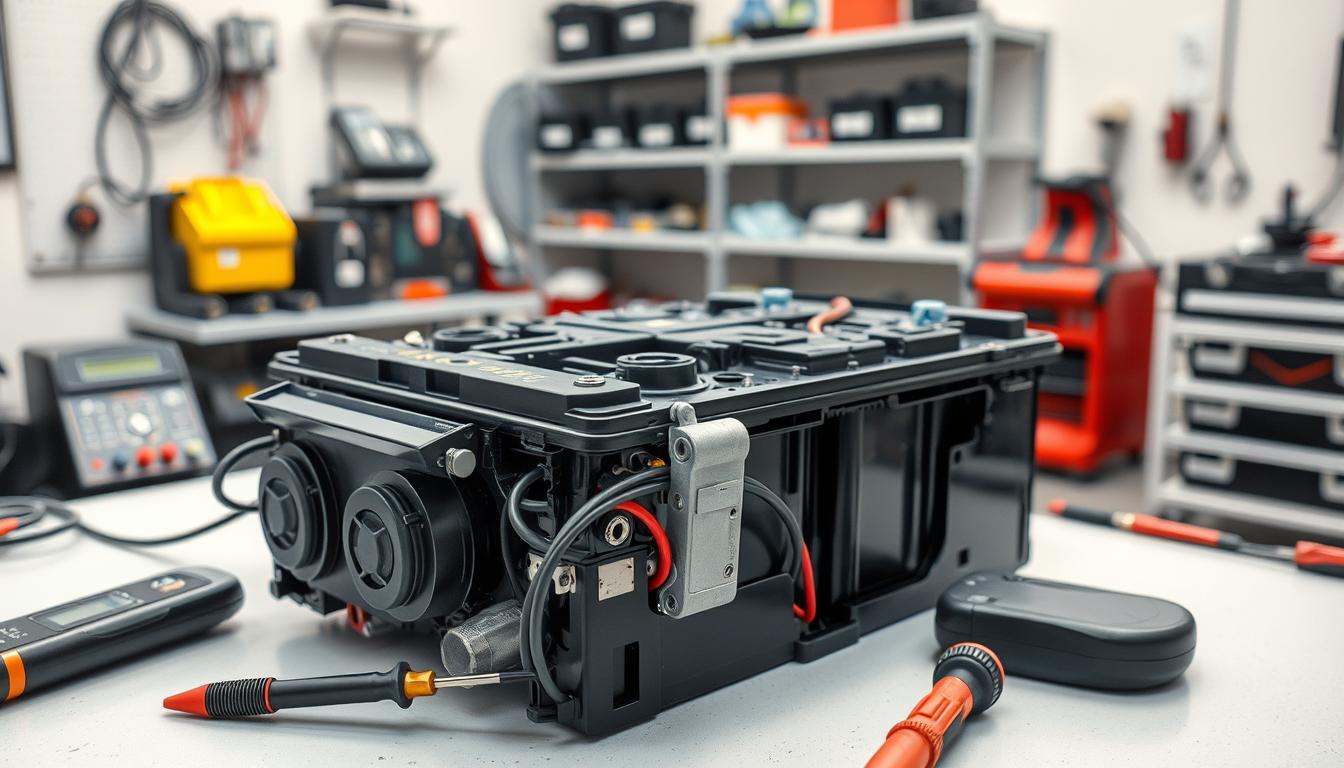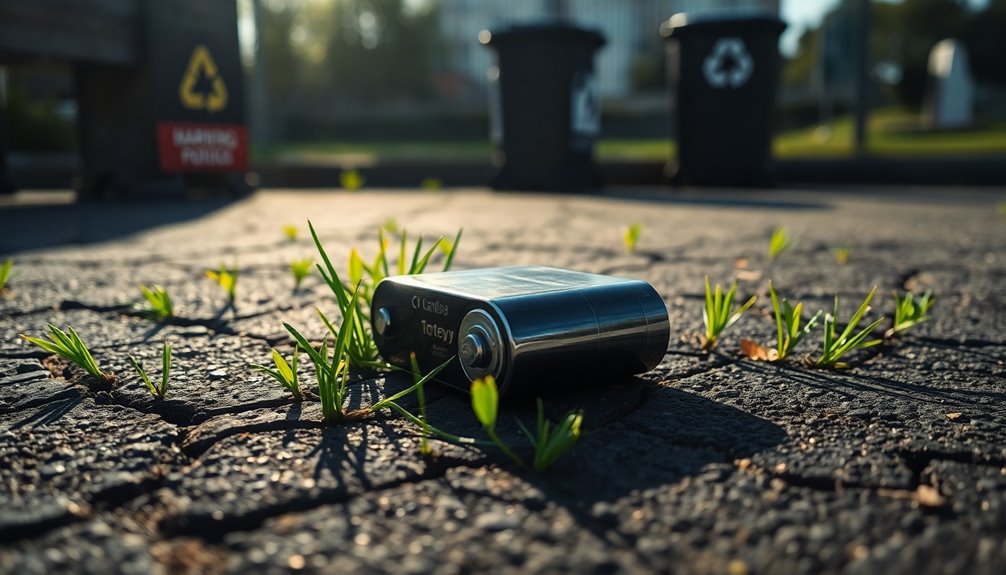Yes, car batteries are 12V, which is essential for your vehicle's electrical system. When fully charged, they can reach about 13.8V, providing the necessary power to start the engine and operate critical components like lights and infotainment systems. Most cars use lead-acid batteries, recognized for their reliability and capacity to support both low and high-voltage demands. Regular maintenance, like cleaning terminals and monitoring voltage, can prolong battery life and performance. If you're curious about the different types or the advantages of lithium-ion batteries, there's a lot more to uncover that can enhance your understanding of automotive power options.
Key Takeaways
- Car batteries typically operate at a nominal voltage of 12V, fully charging up to around 13.8V.
- They primarily use lead-acid technology, crucial for powering vehicle electronics and starting the engine.
- Cold Cranking Amps (CCA) rating indicates a battery's performance in cold weather conditions.
- Regular maintenance, such as terminal cleaning and voltage monitoring, extends the lifespan of a 12V battery.
- Lithium-ion batteries, an alternative to lead-acid, offer longer life cycles and improved efficiency for vehicles.
Understanding 12V Batteries
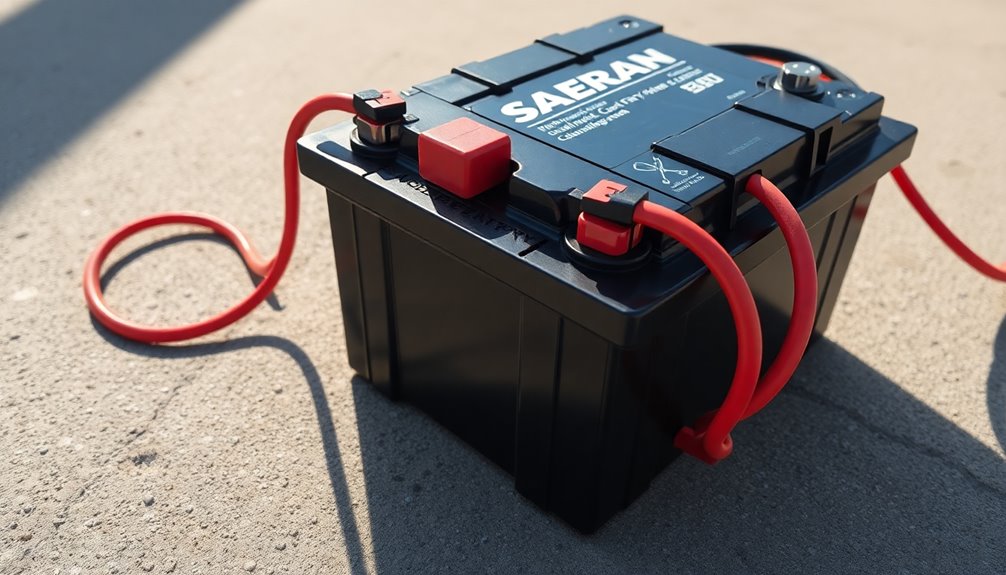
When you think about car batteries, it's important to understand that they typically operate at a nominal voltage of 12V. A fully charged 12V battery can reach around 13.8V, while float charging occurs at approximately 13.4V.
Most vehicles use lead-acid batteries, which consist of lead dioxide and lead plates submerged in sulfuric acid, generating electricity through chemical reactions. These batteries power essential systems like lights, infotainment, and safety functions, and even act as backups for high-voltage battery failures in electric vehicles.
The average lifespan of a 12V battery is 3 to 5 years, influenced by temperature, usage, and maintenance. Regular checks, including terminal cleaning and battery voltage monitoring, are vital to extending their life and performance.
Importance of 12V in Vehicles

The 12V system in your vehicle is essential for powering all its electronics, from headlights to infotainment.
It also plays a key role in starting the engine and supporting high-voltage systems, ensuring everything runs smoothly.
Without a reliable 12V battery, your car's performance and safety could be compromised.
Powering Vehicle Electronics
How essential is the 12V battery in your vehicle? This battery is fundamental for powering all your vehicle electronics, from headlights to infotainment systems.
It guarantees that important components, like safety features and onboard computers, operate smoothly. When the car is running, the alternator or high-voltage system recharges the 12V battery, so it's always ready to supply energy when you need it, even when the engine is off.
In electric vehicles, the 12V battery acts as a safety buffer, keeping critical systems running if the main battery fails.
A healthy 12V battery directly influences your vehicle's performance and reliability, making it indispensable for safe and efficient driving.
Don't underestimate its role!
Starting Engine Effectively
Although you might not think about it often, the 12V battery is essential for starting your vehicle's engine effectively. This lead-acid battery provides the initial energy burst needed to crank the engine, particularly important in cold weather, as indicated by its Cold Cranking Amps (CCA) rating. A fully charged 12V battery delivers approximately 13.8V, ensuring peak performance for both starting the engine and powering essential systems. Without a functioning 12V battery, your vehicle's high-voltage systems can't operate correctly, leading to potential starting failures.
| Feature | Importance | Measurement |
|---|---|---|
| Voltage | Power for starting engine | 12V nominal |
| CCA | Performance in cold temperatures | Varies by battery |
| Fully Charged Voltage | Peak function | ~13.8V |
| Type | Common battery type | Lead-acid battery |
| Role | Supports electrical systems | Critical |
Supporting High-Voltage Systems
While you might focus on the high-voltage systems in your vehicle, the 12V battery plays an essential role in their functionality. It powers important electrical components like infotainment systems, lights, and safety features, ensuring everything operates smoothly—even when the vehicle's off.
In the event of a high-voltage battery failure, the 12V battery acts as a backup for critical systems, including brakes and anti-skid functions, keeping you safe on the road.
As your vehicle runs, the 12V battery recharges via a converter, drawing power from the high-voltage battery, maintaining a steady supply. Regular self-charging every 1-2 days helps keep the 12V battery healthy, fundamental for the overall performance and reliability of both electric and gasoline vehicles.
Common Applications of 12V Batteries
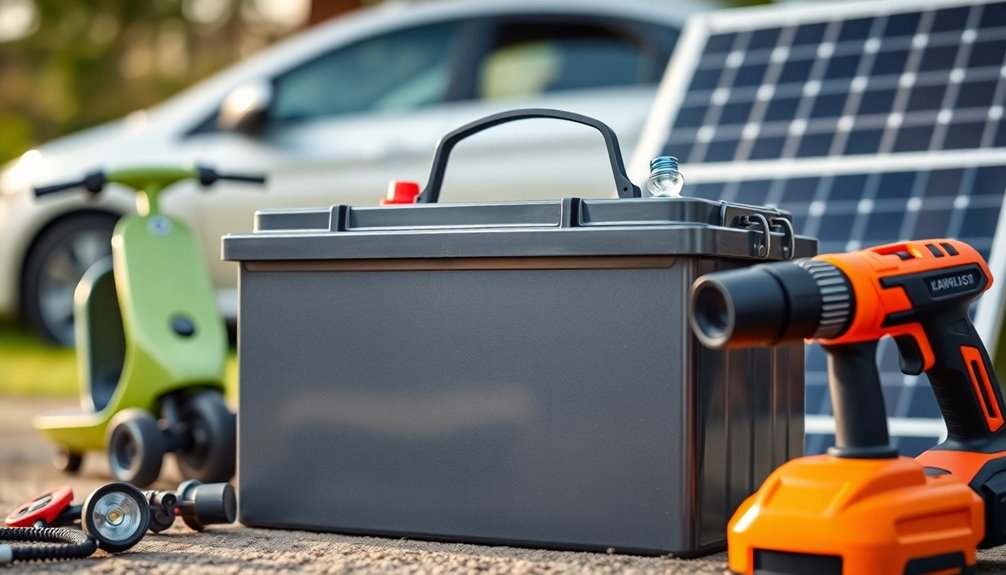
When you think about 12V batteries, consider how essential they're for RV power solutions and marine navigation systems.
These batteries not only keep your RV running smoothly off the grid but also guarantee your boat's electronics stay functional while you're out on the water.
Their versatility makes them a go-to choice for a range of applications, enhancing your adventures whether on land or sea.
RV Power Solutions
As you commence your RV adventures, you'll find that 12V batteries play an essential role in powering crucial appliances and systems, making your off-grid experience enjoyable and comfortable. They cater to your energy needs, supporting lighting, refrigeration, and water pumps. While lead acid batteries are common, many RVers now prefer lightweight lithium-ion and LiFePO4 options for their efficiency and longevity.
Here's a quick look at common RV applications for 12V batteries:
| Application | Power Requirement | Battery Type |
|---|---|---|
| Lighting | 50W | Lead Acid / Lithium |
| Refrigerator | 100W | Lithium |
| Water Pump | 75W | Lead Acid |
| Solar Setup | 300W | Lithium |
| Entertainment System | 150W | Lead Acid / Lithium |
Marine Navigation Systems
Steering through the open waters requires reliable systems, and that's where 12V batteries come into play.
These batteries power essential components of marine navigation systems, including GPS units, chart plotters, and radar systems, ensuring you have dependable operation while at sea. They're important for starting engines and supplying electricity to onboard electronics, enhancing both navigation and safety.
Popular choices like flooded lead-acid, sealed lead-acid (SLA), and lithium-ion batteries each offer unique benefits in maintenance and efficiency.
The stable power supply from a 12V battery also supports communication devices like VHF radios, significant for maritime safety.
Plus, they help with additional onboard amenities such as lighting and bilge pumps, contributing to your vessel's overall functionality.
Types of 12V Batteries
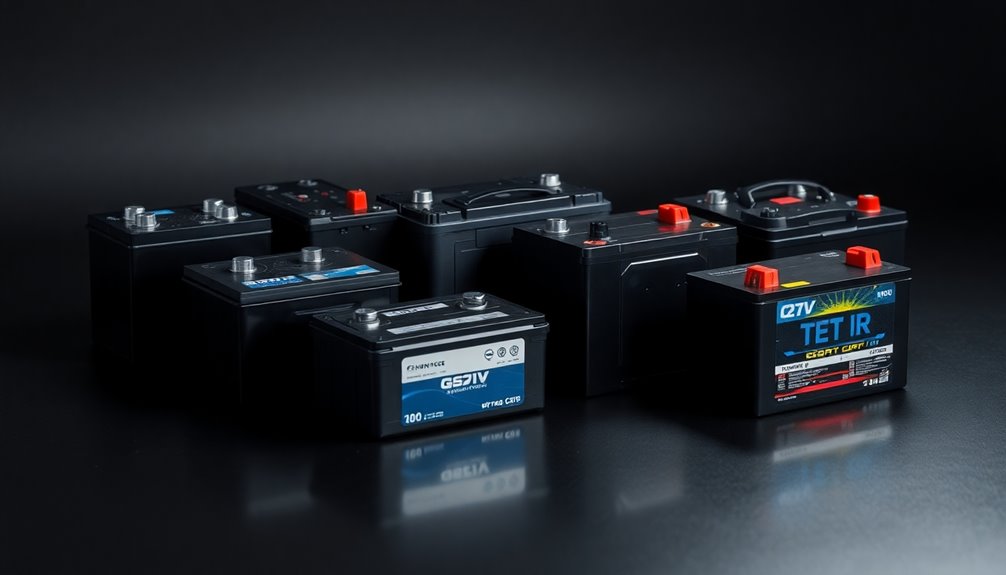
There are several types of 12V batteries, each designed to meet specific needs and applications. The most common types of battery include Flooded Lead-Acid and Sealed Lead-Acid (SLA) batteries.
Flooded Lead-Acid batteries are cost-effective but require maintenance, making them suitable for basic automotive use. In contrast, SLA batteries—like AGM and gel types—are low maintenance and excel in rough conditions.
If you're looking for something lightweight and efficient, consider Lithium-Ion batteries, which have a long lifespan but come with a higher initial cost.
Ultimately, LiFePO4 batteries stand out for their safety and eco-friendliness, boasting over 2000 charge cycles, making them great for off-grid applications and electric vehicles.
Choose wisely based on your needs!
Benefits of Lithium-Ion Technology

When you consider upgrading your car battery, lithium-ion technology stands out for several reasons.
It's lightweight and portable, making it easier to handle and install.
Plus, with a longer lifespan and high efficiency, you'll get more value and performance from your investment.
Lightweight and Portable
While traditional lead-acid batteries weigh you down, lithium-ion technology offers a lightweight and portable solution that's perfect for various applications.
These lithium-ion batteries are considerably lighter, making them ideal for electric vehicles and portable devices where weight matters. With a higher energy density, they store more energy in a smaller package compared to standard 12V lead-acid batteries. This means you can enjoy extended usage without the bulk.
Plus, they charge quickly, allowing you to power up in no time—a vital feature for on-the-go needs. The lightweight nature also enhances fuel efficiency in vehicles, directly improving energy consumption and performance. Furthermore, the benefits of energy-efficient heat pumps can be seen as a parallel in the growing trend towards sustainable energy solutions.
Embrace lithium-ion technology for a more efficient, portable power source!
Longer Lifespan
Although many people underestimate the importance of battery lifespan, choosing lithium-ion technology can greatly enhance your experience.
With a longer lifespan than traditional lead-acid batteries, lithium-ion batteries can achieve over 2000 charge cycles, making them a more reliable option for your vehicle. You'll enjoy not only extended use but also quicker charging times, allowing you to get back on the road sooner.
Plus, lithium-ion batteries maintain about 95% of their charge during storage, making them perfect for seasonal use. Their lightweight design and eco-friendly composition further enhance their appeal, reducing environmental impact while providing excellent power storage. Additionally, transitioning to cleaner energy sources, such as renewable energy, can further reduce the overall environmental footprint of battery production and usage.
Embracing lithium-ion technology means investing in a battery that lasts and performs better than its lead-acid counterparts.
High Efficiency
Given their remarkable energy density, lithium-ion batteries stand out for their efficiency in automotive applications.
These batteries provide a high voltage while remaining lightweight, making them perfect for electric vehicles. You'll appreciate their longer lifespan, often surpassing 2000 charge cycles, which means you get more value over time.
Plus, they charge faster than traditional lead-acid batteries, allowing for quick power replenishment during short stops.
With built-in Battery Management Systems (BMS), lithium-ion batteries guarantee safe operation by preventing overcharging and deep discharge.
Their eco-friendly design, free from toxic lead or acid, considerably reduces your vehicle's environmental footprint compared to conventional battery technologies.
Embracing lithium-ion technology not only enhances performance but also supports a sustainable future.
Choosing the Right Battery
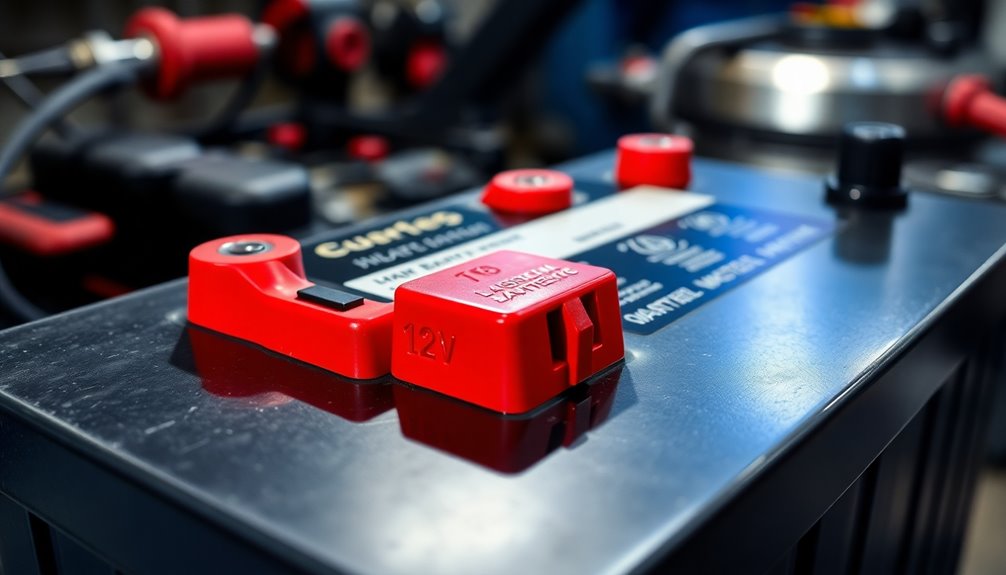
When choosing the right battery for your vehicle, understanding the specifications is essential. Start by identifying the correct battery group, as it defines the dimensions, voltage (6V or 12V), and terminal locations needed for compatibility.
Pay attention to Cold Cranking Amps (CCA), which indicate how well the battery performs in cold temperatures; higher numbers mean better starting power. Additionally, consider the reserve capacity, which shows how long your battery can provide power without charging system assistance—vital during emergencies.
Always consult your vehicle owner's manual for manufacturer recommendations on battery groups to guarantee peak performance. Finally, check for current battery deals and guides to help you select the best options that fit your specifications and budget.
Installation Tips for 12V Batteries
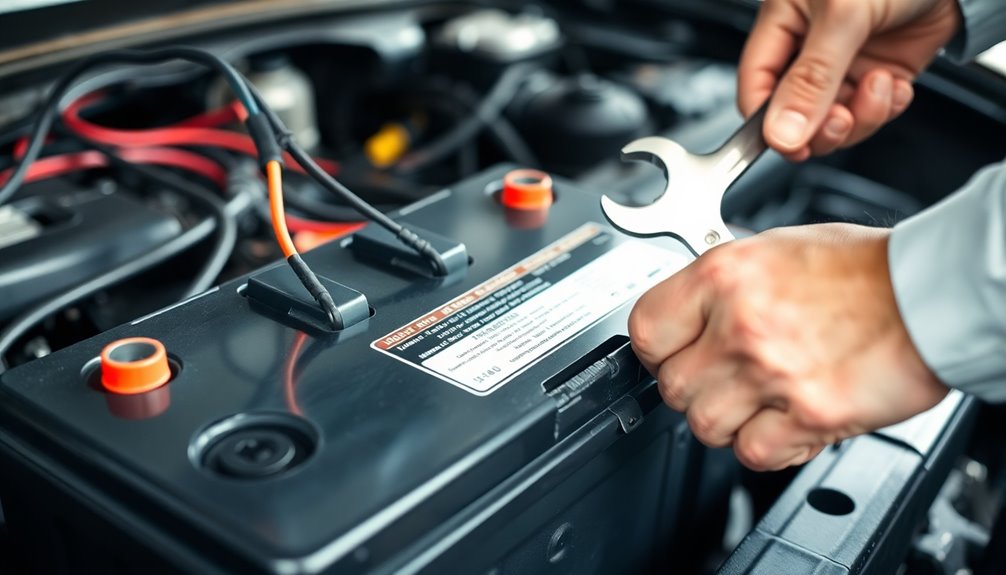
Installing a 12V battery correctly can greatly impact your vehicle's performance and reliability. Start by choosing a dry, well-ventilated installation area to prevent overheating and moisture buildup. Secure the battery tightly to avoid movement during operation, especially in mobile setups like RVs or boats. Always follow the manufacturer's wiring guidelines, verifying you use the recommended cable sizes and fuses. When connecting, attach the positive terminal first, then the negative, to reduce the risk of short circuits.
Here's a quick reference table:
| Tip | Action |
|---|---|
| Installation Area | Confirm it's dry and well-ventilated |
| Securing the Battery | Use brackets or straps to prevent movement |
| Wiring Guidelines | Follow manufacturer's specifications |
| Terminal Connections | Positive first, negative last |
| Regular Inspections | Check connections and clean terminals |
Maintenance Best Practices
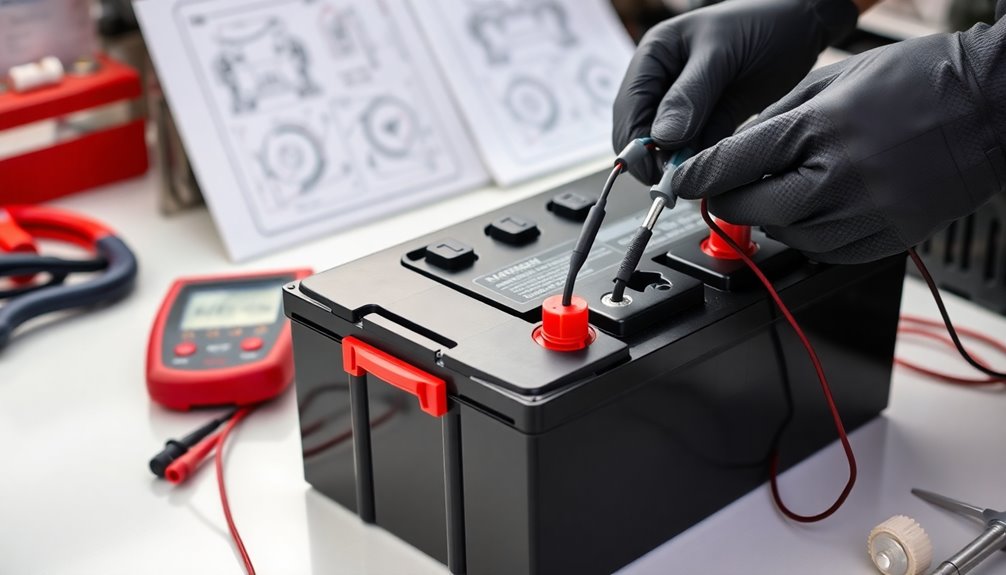
To keep your 12V battery in peak condition, regularly inspecting connections and cleaning terminals is vital. This prevents corrosion and improves electrical conductivity, extending battery life.
Use a LiFePO4-compatible charger for best performance, as standard chargers might damage lithium batteries. Store your battery at a 50-60% charge in cool, dry conditions, and check the charge every 3-6 months to maintain its health during inactivity.
It's important to monitor the battery voltage regularly, especially before long trips, verifying it's at a safe level to avoid unexpected failures.
Always follow manufacturer guidelines for battery maintenance and charging to guarantee compatibility and safety with different battery types.
Taking these steps will help you enjoy reliable power from your 12V battery.
Safety Features of 12V Batteries
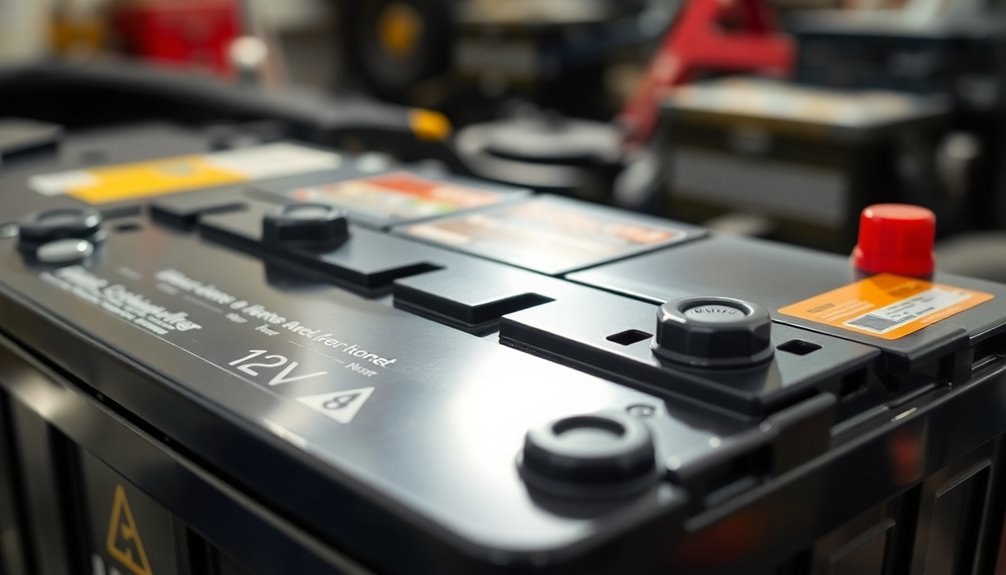
While many people may not think about it, the safety features of 12V batteries play an essential role in their reliable operation.
Lead-acid batteries, including AGM types, are designed with venting systems to release gases during charging, preventing pressure build-up and reducing explosion risks.
Modern 12V batteries often include built-in Battery Management Systems (BMS) that monitor charge levels, preventing overcharging and deep discharge, which enhances overall safety.
Additionally, safety fuses disconnect the battery during overload, protecting your vehicle's electrical system.
Regular maintenance, like inspecting terminals and connections, minimizes risks related to corrosion and poor contact.
With these safety features, you can trust that your 12V battery operates safely and efficiently.
Environmental Impact of 12V Batteries

As you consider the environmental impact of 12V batteries, it's vital to recognize the potential hazards they pose, particularly with lead-acid types that contain harmful materials. Improper disposal can lead to serious pollution.
Here's what you should keep in mind:
- Lead and sulfuric acid can contaminate soil and water, harming ecosystems.
- Battery recycling is imperative; about 96% of lead from recycled batteries can be recovered and reused.
- Lithium-ion and LiFePO4 batteries offer a greener alternative, needing less frequent disposal and promoting sustainability.
To minimize your environmental footprint, always recycle your batteries properly.
Utilizing advanced battery management systems can also enhance battery life and efficiency, further reducing resource consumption.
Frequently Asked Questions
Can a Car Battery Power Your House?
You can use a car battery to power your house temporarily, but it's not ideal for long-term energy needs.
Car batteries have limited capacity and typically last only a few hours under heavy load.
If you want to keep essential systems running, you'll need a deep cycle battery or a dedicated home battery system.
Plus, don't forget an inverter to convert the battery's DC power to the AC needed for most household appliances.
Can a Car Battery Show 12V and Still Be Bad?
Yes, a car battery can show 12V and still be bad.
While a reading of 12V might seem normal, it doesn't guarantee the battery's health. It could indicate undercharging or internal issues, such as bad cells or sulfation.
To get a true assessment, you should test the battery under load with a specialized tester. This way, you can uncover any hidden problems that might prevent your car from starting reliably.
What Is the Function of the 12V Battery?
Think of the 12V battery as the heartbeat of your vehicle. It powers essential electrical components like lights, infotainment systems, and sensors, keeping everything running smoothly.
When you start your engine, it's the 12V battery that kicks things off, ensuring your onboard computers and diagnostics function properly.
It also acts as a backup for critical systems, maintaining connectivity features and safety functions, even when your car's turned off.
Can a Car Battery Give a False Reading?
Yes, a car battery can give a false reading. If you've got poor connections or corrosion on the terminals, it'll impede accurate voltage measurements.
Even if the battery seems fine, temperature extremes can affect its performance, leading to misleading readings.
Plus, a failing battery cell might mask issues until you load it. To avoid inaccuracies, make sure you're using a reliable multimeter and allow the battery to rest before testing.
Conclusion
In summary, understanding 12V batteries is essential for anyone relying on them for their vehicle's power. From their significance in everyday driving to the advancements in lithium-ion technology, these batteries play an integral role in our lives. So, the next time you turn the key in your ignition, consider: how would you manage without this critical source of energy? By staying informed and practicing proper maintenance, you can guarantee your battery keeps you moving forward.

